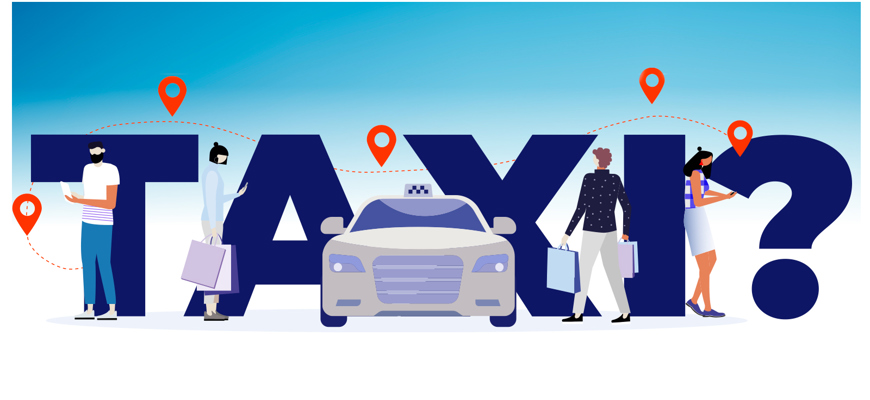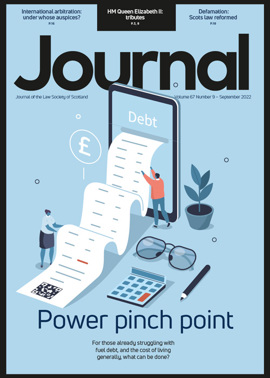Taxi?

I imagine many dedicated readers of the Journal may, like me, have gone out for a nice meal or a drink with friends, and been struck by the lack of taxi or private hire car provision. The night-time economy is, in a general sense, imperilled, and the lack of transport in the later hours is a significant barrier to a properly prosperous night-time sector. Many drivers fell out of the trade during the pandemic and have gone on to other careers. It is a period of tumult for the hardworking taxi and private hire drivers of Scotland; and in turn, for those who seek to use their services.
A significant change in the trade generally is the move away from traditional telephone bookings and the ever-increasing reliance on apps. Those who have used taxi or private hire booking apps will see the benefit in the details provided: the name of the driver, the car make, model and registration number, as well as in some cases live updates on location. A recent English case revolving around the use of a booking app makes for interesting reading about an age old imponderable – what is the difference between a taxi and a private hire car? These are two separate licences issued under the Civic Government (Scotland) Act 1982.
Waiting to serve
In fact, there are actually five types of licences which relate to this trade: a taxi operator licence (the vehicle), a taxi driver licence (the driver), a private hire car operator (the vehicle), a private hire car driver (the driver), and a booking office licence. Joe Public might simply refer to a “taxi” as a catch-all term – but don’t let an actual taxi driver catch you calling a private hire car a taxi!
Section 23 of the 1982 Act defines a “taxi” as “a hire car which is engaged, by arrangements made in a public place between the person to be conveyed in it (or a person acting on his behalf) and its driver for a journey beginning there and then”. The key difference is that a taxi can, to use the English phrase, “ply for hire”. In other words, it can pick up a fare from the street without being booked in advance. A private hire car cannot do this: it must be pre-booked and cannot accept a random fare.
This brings us to R (United Trade Action Group Ltd) v Transport for London [2022] EWCA Civ 1026 (22 July 2022). In this case the issue revolved around whether a parked private hire car, or a car driving around waiting to be assigned a job via an app was acting, illegally, as a taxi. The Court of Appeal was firm in its view that such behaviour did not cross the line into acting as a taxi, following earlier decisions (Reading Borough Council v Ali [2019] 1 WLR 2635, and Cogley v Sherwood [1959] 2 QB 311) which required there to be both “solicitation” and “exhibition”.
While an English case, this chimes with the equivalent position in Scotland and is helpful to appreciating the nuance between the two types of licence in the app-using world we all live in. A private hire driver in their car waiting to be allocated a booked fare via the app, who is not soliciting fares in the street or exhibiting the car as available “there and then” – to use the Scottish language – has not crossed the red line.
Virtual hearings and party applicants
The Coronavirus (Recovery and Reform) (Scotland) Act 2022 has now made permanent the facility for licensing boards and committees to offer hybrid or fully virtual hearings, a staple of the lockdown experience for licensing lawyers across the country. It is safe to say that the majority of taxi/private hire licence holders “appear” as party applicants, without representation. There are numerous cases I am aware of where I or my colleagues across the licensing bar have witnessed cases where applicants have “appeared” holding their smartphones while standing in their kitchen, walking around the streets, or even in one infamous case involving a private hire driver, with his phone in a dock inside his car – as he was driving.
While the virtual offer allowed business to be done during lockdown, concerns remain about livelihood-altering decisions being made where it may be that the seriousness of the hearing is not fully understood in the virtual environment. As these options are here to stay, it makes it very important that authorities underline the formality or importance of matters in their citations and calling letters.
Tax burden for authorities
There are changes on the horizon in Scotland which will affect both taxi and private hire car drivers equally. They relate to the addition of tax checks as part of the licence process. The UK Government has been exploring the use of the licensing system to introduce “tax conditionality” measures for some time – this was first proposed back in 2016. On 20 July 2022 it was announced that the 1982 Act will be changed, from 1 April 2023, to introduce a tax check requirement for applicants for these licences. The new law will require applicants to undergo a bespoke check to confirm they are tax registered. Licensing authorities will have to establish that the tax check has been completed before they process an application.
There are a number of issues around this which I and other commentators have raised with the UK and Scottish Governments, and HMRC. A key concern for local authorities is the impact on resource, and the knock-on effect on the delivery of their licensing function generally. There are thousands of these applications, and this extra step will create delays – not just for the applicant in hand, but applicants for all the myriad other licences for which the local authority licensing staff are responsible.
We shall have to see just what these new checks will mean for processing times and delays; but there remains for me a wider, more fundamental concern about the legislative precedent being set – and that surrounds the principle of improper use, for which there is longstanding jurisprudence in Scotland. In short, I suggest that a licensing regime should not be used to “get at” some mischief but should be focused solely on the purpose for which the regime was created. Is it the job of the licensing authority to be a guardian for tax propriety? Where art thou, HMRC?
Proper purpose
The list of cases which support the idea that licensing decisions should be based on the proper purpose of the licensing regime is a long one: Stewart v Perth & Kinross Council [2004] UKHL 16; Spook Erection Ltd v City of Edinburgh Council 1995 SLT 107; Gerry Cottle’s Circus Ltd v Edinburgh District Council 1990 SLT 235; Bantop Ltd v City of Glasgow District Licensing Board 1990 SLT 366; Brightcrew Ltd v City of Glasgow Licensing Board [2011] CSIH 46; Bapu Properties Ltd v City of Glasgow Licensing Board (22 February 2012, unreported); and goes back to Dunsmore v Lindsay (1903) 11 SLT 545, indicating the vintage of the proposition in Scots law. The point was perhaps most recently ventilated in the context of the 1982 Act in McCluskey v North Lanarkshire Council [2016] SC HAM 3, the now famous “burger van” case.
In McCluskey the council sought to ban burger vans from being located near schools on the grounds of the nutritional value of the food being offered, which it was said was of detriment to the children. The council was, in short, using the licensing system to address perceived issues around child obesity, and therefore the question was one of vires.
Sheriff Smith makes a number of points which draw out the relevance of vires and proper purpose (at para 65): “That obesity among the general population and children especially is considered problematic is not in dispute. That elected representatives wish to confront this problem and take steps to promote healthier lifestyles is to be commended. Neither of these is the issue in this case. The issue is whether the defender, as a licensing authority, has the power to impose this particular condition upon the licences of street traders. In my judgment it does not.” And further (at para 96): “Imposing a condition because one has to be seen to be doing something is an ulterior purpose and not a licensing purpose.”
I consider that, had a licensing authority sought to impose a tax check via a licence condition or local policy, a licence holder would have had good grounds for challenge. In the present case, as this is an amendment by Parliament to the primary legislation, the question is not one of the vires of licensing authority decision making. Nevertheless, as a licensing lawyer it jars with me to have the licensing system used to address a non-licensing mischief, no matter the desirability.
While it may be argued by some that ensuring taxi drivers are properly registered for tax purposes speaks to their “fitness”, I consider that to be too remote – too alien to the purpose for which the licensing regime exists, especially when other, existing laws are in place for which the purpose is a direct one.
Properly applied, licensing systems should be focused on the purpose of the licence, and not a panacea.
Regulars
Perspectives
Features
Briefings
- Civil court: Pointers to the future
- Intellectual property: Data mining for all
- Agriculture: The next land reform package
- Corporate: Developments and divergence in data
- Sport: Lessons from the Whyte review
- Scottish Solicitors' Discipline Tribunal
- Property: Registration – over a decade?
- In-house: The top team – three more years






